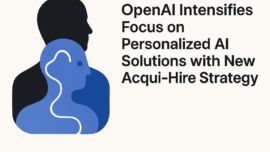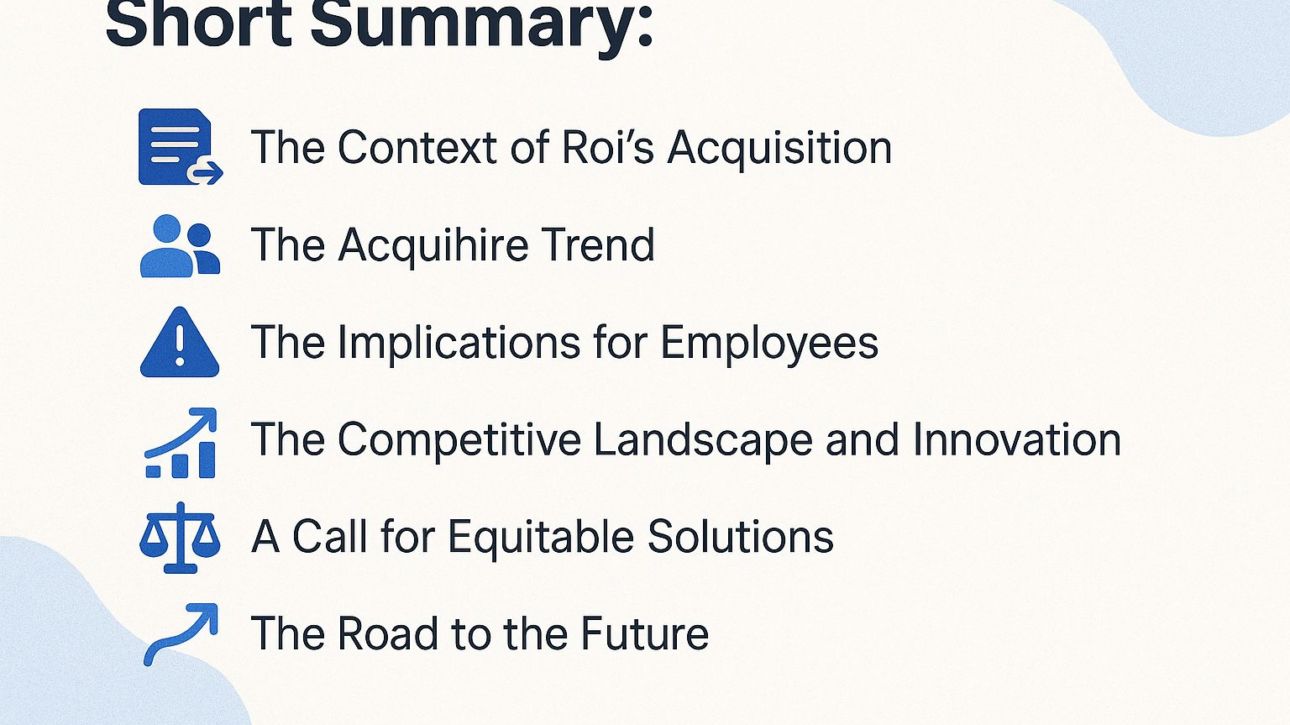
OpenAI is ramping up its focus on personalized artificial intelligence solutions through a new strategy that prioritizes “acqui-hires,” shedding light on the evolving landscape of AI talent acquisition.
Contents
Short Summary:
- OpenAI acquires Roi, emphasizing personalization in AI applications.
- This strategy mirrors a broader trend among tech giants to secure top talent via acquihires.
- The implications for employee equity, innovation, and competition raise critical questions for the industry.
OpenAI’s recent acquisition of Roi, an AI-driven personal finance app, offers a glimpse into the company’s ambitions to deepen its focus on personalization in artificial intelligence applications. In a move that aligns with the increased competition for top talent, Roi’s CEO, Sujith Vishwajith, will be the sole member of the four-person team transitioning to OpenAI, leaving the remaining employees as the company prepares to dissolve its operations.
This acquisition reflects OpenAI’s ongoing strategy to enhance its consumer-facing services, tackling the complex world of financial personalization, albeit at a time when industry trends lean heavily towards the practice of acquihires—where companies primarily acquire startups to gain access to specialized talent rather than products or technology. As many observers have noted, “Acquihiring is becoming Silicon Valley’s shortcut for securing elite talent amidst an AI gold rush.”
The rise of acquihires presents both an opportunity for startups and a challenge for the broader tech landscape. With billions flowing into AI talent, this strategy appears as a strategic response to a saturated acquisition market. OpenAI’s decision to acquire Roi, along with several other startups this year, further emphasizes the growing importance placed on personalized user experiences—essentially making technology not just functional but also significantly engaging for users.
The Context of Roi’s Acquisition
Founded in 2022, Roi successfully raised $3.6 million in seed funding from prominent investors, including Balaji Srinivasan and Gradient Ventures. Its focus was on aggregating an individual’s financial portfolio, covering areas such as stocks, cryptocurrencies, real estate, and even NFTs, with the aim of creating a holistic view of users’ financial standing.
“We started Roi three years ago to make investing accessible to everyone by building the most personalized financial experience,” said Vishwajith in a statement. “Along the way we realized personalization isn’t just the future of finance; it’s the future of software.”
Roi’s offering included a distinct AI companion designed to provide users with unique, personalized interactions—an innovation in how financial services engage with consumers. The adaptive nature of Roi’s AI allowed it to understand user preferences and deliver insights in a relatable manner, demonstrating a need for human-centric AI solutions.
This approach aligns closely with OpenAI’s previous initiatives such as the Pulse app, which provides users with personalized news reports, and Instant Checkout, a feature integrating commerce directly into ChatGPT interactions. The upcoming talent and tech from Roi could bolster OpenAI’s efforts in making its services even more user-friendly and adaptive, moving beyond traditional neural network-driven models to something that feels more personal and intuitive.
The Acquihire Trend
The acquihiring trend is indicative of a larger strategic pivot among tech giants scrambling to dominate the burgeoning AI landscape. Google’s acquisition of Windsurf’s top executives for approximately $2.4 billion and Meta’s recent ventures highlight a defined path towards talent acquisition that bypasses traditional frameworks.
For instance, Google’s earlier acquisition of Character.AI not only resulted in a licensing agreement but also facilitated the return of industry veterans back to their roots in the company. Such moves allow companies to obtain the necessary expertise and insights without the red tape normally associated with full-scale acquisitions. This is especially pertinent in the high-stakes world of AI, where the speed of innovation can determine the market leader.
“Acquihiring allows companies to harness capabilities quickly while avoiding complicated merger reviews,” explained an industry analyst. “It’s a tactical way of navigating the competitive landscape.”
This tactical maneuvering against regulatory challenges underscores the shifting dynamics of tech acquisitions. Traditional pathways can hinder rapid integration and application, stipulating the urgency with which tech companies like OpenAI are pursuing these innovative workarounds.
The Implications for Employees
However, while these deals have undeniable benefits for acquiring firms and their early investors, the phenomenon raises pointed questions about employee equity and the future of work in the startup environment. Often, rank-and-file employees are left with no substantial returns from an exit while founders and investors reap substantial rewards.
The case of Windsurf strikingly emphasizes this concern. Although Google negotiated favorable terms for early stakeholders, many employees faced an uncertain future, stripped of supportive leadership and resources necessary for their roles.
John F. Coyle, a law professor at the University of North Carolina, remarked, “The acquihire model is inherently flawed in how it discusses the value of the people involved; it tends to leave behind the larger workforce—the real builders of the technology.”
As this acquihire trend continues, the challenge lies in maintaining a sustainable startup ecosystem. When foundational teams are converted into mere talent pools for larger corporations, it risks stifling the organic innovation cycle fostered by diverse teams collaborating on groundbreaking ideas.
The Competitive Landscape and Innovation
The thirst for talent is evident, particularly as AI valuations skyrocket—OpenAI alone has been valued at over $150 billion. Given the intense competition for highly skilled AI professionals, strategic hiring tactics are paramount for tech giants seeking to maintain a competitive edge.
Despite the disruptive nature of this market, there are notable exceptions where startups manage to retain their employees while obtaining substantial investments or navigating mergers. Yet, as they are gradually absorbed into larger entities, the risk remains that their unique culture and innovative spirit may be eroded—thus concentrating AI development power in the hands of few.
The tension between the needs of founders and the demands of larger entities creates a paradox: while the potential for innovation exists, the model itself may hinder the diversity necessary for groundbreaking progress.”
A Call for Equitable Solutions
The question then becomes a matter of future strategies that could lead to a more equitable distribution of value. Regulatory bodies need to take note; the patterns observed in these acquihire models point toward an increasingly entrenched monopolization of talent and innovation.
If antitrust regulations tighten, we might expect a gradual shift back to more traditional acquisition frameworks, where customer bases and employee interests will play a more central role. As OpenAI pushes forward with its vision of personalized AI solutions, there is a pressing need for dialogues around how to ensure all stakeholders benefit from the sweeping changes taking place in the industry.
The Road to the Future
The landscape of AI is evolving, and with it, the strategies employed by companies to acquire talent and innovation. OpenAI’s focus on personalized solutions reflects a broader trend where human engagement and adaptive technologies are deemed essential for future success. However, at what cost remains an open question, one that requires collective responsiveness from all involved parties.
As we look to the future, it is critical to balance the ambitions of industry giants against the need for viable ecosystems that nurture productivity and creativity across the board. If we ignore the needs of the wider workforce, we risk dismantling the diverse foundation that fuels true innovation in AI and beyond.
With the road ahead marked by both promise and peril, the evolving practices of acquihires and personalized AI solutions will require ongoing scrutiny and adjustment. The ultimate goal should aim toward inclusivity and equitable distribution of success within an industry characterized by rapid change and widespread influence.
For more insights into how AI is reshaping industries, check out Latest AI News and explore how AI tools can enhance your own content strategy at Autoblogging.ai.
Do you need SEO Optimized AI Articles?
Autoblogging.ai is built by SEOs, for SEOs!
Get 30 article credits!


